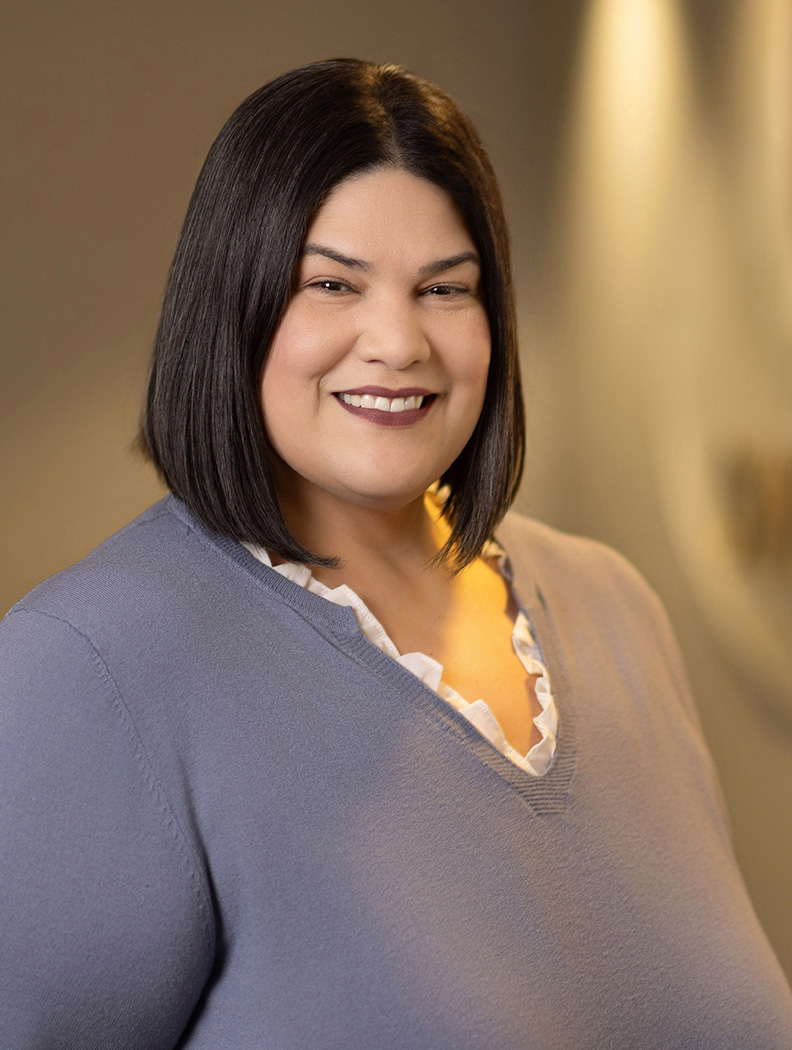For Any Cancer Diagnosis
- Q.
My mother is 85 and was told she has stage 3 cancer. She doesn't seem to understand exactly what is going on and is passive. We're not that pleased with her doctors. I don't want to be pushy, but how can we help her?
A.Challenges that may affect older adults and their ability to make health care decisions include how they process information, how they cope with the stress of the diagnosis, and how their medical team communicates with them. With this in mind, family support can play an important part in your mother’s care. I’d start by asking your mother if she would like your help, and if so, what areas she would like help with. This might include meeting with her medical team to discuss her treatment plan or helping her prepare for her appointments.
Questions to ask about her treatment include:
- What is the recommended treatment and possible side effects?
- How could treatment affect other co-existing health issues?
- Is the goal longer survival, which may mean a more intensive treatment, or is it quality of life?
Ways to involve and organize your mother include:
- Take notes at her appointments or ask if you can record the discussion
- During the appointment, ask her if she has questions
- Repeat and review the information after the appointment, allowing her time to process information
- Keep a calendar to record her appointments
- Use a notebook to keep track of symptoms and side effects
- Create a file for all paperwork related to her diagnosis, including copies of important records
- Compile a current list of all her medications and phone numbers/addresses of all of her health care providers.
Your mother’s medical team is one of the most important aspects of her care, and as a health consumer she has every right to receive quality care. It is essential that older adults and their loved ones be able to openly and honestly discuss their care with their doctors and any potential difficulties that may arise. For more guidance please read, “Doctor, Can We Talk? Tips for Communicating With Your Health Care Team”. If she is not comfortable with quality of care she is receiving, she may need to explore other options. Though this may seem daunting, your mother’s primary care doctor or even a local hospital can provide her with referrals.
- Q.
I have received several different treatment recommendations from doctors, and I have to decide what type of treatment to have. This overwhelms me. How can I make the right choice?
A.It’s normal to feel scared about making such an important decision, and it is a decision you need to make in partnership with your healthcare team. Women today are offered many more choices than in the past, and are often asked to make the final decision about their care. You need to gather information about your different treatment options so that you feel confident discussing your concerns with your doctors.
After talking with your doctors, keep in mind that you have obtained an expert medical opinion, and you need to understand your doctor’s perspective by asking why he or she has made that recommendation. It is important that you not compare yourself to other women in a similar situation. Even women who have the same diagnosis can have a different treatment plan—neither is right or wrong. Rather, it is individualized to you and your body. However, you can review with your doctor the information you learn from other women who have your type of cancer to better understand your own treatment plan.
In making a decision about what treatment to choose, make sure you identify what is most important to you. For example, if you are concerned about chemotherapy, what are the reasons for your concern? What questions do you need answered? Often, people fear that if they choose one type of treatment over another, they will always worry that they did not choose correctly. Instead, ask yourself questions such as: “What am I being told, and why? What do I think is the best choice for me at this time?” The most important thing is that you make the decision that you are most comfortable with.
For more guidance read our publications, Communicating With Your Health Care Team and Doctor, Can We Talk?
To learn more about your treatment options, contact The National Cancer Institute’s Cancer Information Service (800-4-CANCER), which provides the latest cancer treatment information as well as a list of comprehensive cancer centers.
CancerCare’s professional oncology social workers assist women with cancer by providing emotional and practical support, free of charge. Call 800-813-HOPE (4673) or email info@cancercare.org.
- Q.
I've just been diagnosed with cancer. How can I get information to help me make treatment decisions?
A.There is a great deal of information about cancer and cancer treatments, especially online. The challenges are how to find and evaluate information to make sure it is reliable, up-to-date, trustworthy and appropriate to your diagnosis and situation. For cancer information, I recommend contacting The National Cancer Institute’s Cancer Information Service (CIS) to speak with an information specialist by calling 800-4-CANCER.
To help you evaluate online information, keep these questions in mind:
- What is the purpose of the website? Is it educational or commercial—that is, is the site trying to sell you a product or service?
- What is the source of the information?
- Is the information evidence-based—that is, based on scientific research?
- Does the website provide contact information for individuals who are responsible for its content?
- Are the links relevant and appropriate for the site?
Once you have information, the next challenge is how to make sense of it. Ultimately, your doctor and health care team are best able to help you interpret information. Identify someone on the health care team you are comfortable talking to. Then:
- Write down your questions before your doctor visit
- Ask questions if you don’t understand what the doctor says
- Take notes and if possible, bring someone with you who can assist you
Interpreting medical tests requires that you consult with your health care team. Make sure you ask for copies of lab tests, biopsy results, X-Rays, ultrasounds, CAT and PET scans, or MRIs. Schedule time with your doctor and health care team to review all test results, and their implications for your treatment and care.
CancerCare has a number of publications that offer practical tips:
- Q.
I want to ask my oncologist about other types of treatments, but am concerned she might think I'm questioning what she has recommended. Is this something most patients do and how should I bring up?
A.The issue of exploring “other” treatments, which differ from recommended treatments your doctor has prescribed, is a topic that many patients would like to discuss with their doctors. However, some patients report feeling concerned that this discussion could affect the relationship and quality of their care. Patients may feel that their doctors are so busy that the appointments are rushed and information is given in unfamiliar medical terms, or that they do not know what to ask or feel intimidated.
A patient’s relationship with his/her doctor is both a professional and personal one. We believe that our doctors and the health care team will be medically effective and, at the same time, compassionate in caring for us. Good doctor/patient communication is key, and communicating effectively with the doctor is a skill that may need attention and practice.
CancerCare’s publication “Doctor, Can We Talk?”: Tips for Communicating with Your Health Care Team suggests a number of recommendations:
Before the Appointment
Remember you are the consumer, and the best consumer is an informed consumer. Learn about your cancer and possible treatments. Know who is on your health care team, including the nurses, social workers and patient navigators.
Create a journal or binder of your cancer experiences. Note the dates of your appointments, the names and contact information of your health care team, as well as a list of medications with dosages. You can also keep a diary of side effects as well as questions that you have for your next appointment. Writing down questions before your appointment will help you feel more organized. If your doctor is open to this suggestion, send your questions to the doctor before the appointment.
During the Appointment
Write down your doctor’s comments, advice and answers to your questions. If you feel that this will not work for you, bring someone to the appointment who can do this for you or ask if you can record the appointment.
Try to be focused and to the point. Explain your cancer experience clearly and briefly, including symptoms and medication side effects.
Ask the doctor to repeat a comment, to use language that is easy to understand, or even to slow down. If something is unclear, repeat it to the doctor as you have heard it. Be assertive but also be understanding. If the doctor is in a rush, ask if there is another member of the team, such as a nurse or social worker, who can answer your questions.
Through the use of the Internet, there is an abundance of medical information as well as opportunities to connect with people in a similar situation. Doctors report that they are very aware that patients have greater access to medical information and are often more educated about their cancer and treatment than in years past. Many doctors are prepared and are available for more in-depth discussions with their patients. Keep in mind that doctors may not know all there is to know about every cancer and its treatment. Many doctors welcome information, questions and discussions of other treatments. In fact, some physicians have stated that they have learned about other treatments because of information that a patient presented.
It is suggested to ask your doctor how he/she feels about your bringing in research and information about your cancer and asking questions about “other” treatments. This will give you some insight as to what your doctor may or may not feel comfortable discussing.
Professional oncology social workers can help you learn to better communicate with your doctor and health care team. Call CancerCare at 800-813-HOPE (4673) to speak with a social worker.
For Breast Cancer
- Q.
Where can I find treatment guidelines and recommendations for triple-negative breast cancer?
A.Each person’s cancer is different, and so there is no one-size-fits-all treatment for triple-negative breast cancer. New research suggests that even within triple-negative breast cancer, there are many subtypes. Therefore, the best treatment plan is one that your medical team carefully tailors to your unique situation. Generally speaking, treatment for triple-negative breast cancer commonly consists of surgery, chemotherapy (given neo-adjuvantly – before surgery – or adjuvantly – after surgery), and radiation. Even when surgery appears to successfully remove all visible cancer, chemotherapy is often given as systematic therapy, as it treats the whole body by moving through the bloodstream. Chemotherapy adds an extra layer of protection against cancer recurrence because there is a chance that tiny cancer cells could remain in the body after surgery. Triple-negative breast cancer is uniquely chemosensitive, meaning that chemotherapy is a very effective treatment for this subtype of breast cancer. Common chemotherapies for triple negative breast cancer may include an anthracycline such as Adriamycin, alkylating agents such as Cytoxan, and a taxane, such as Taxol or Taxotere. Fluorouracil (5FU) may be given as well. Often a combination of drugs, or a “chemo cocktail,” is given to disable and kill cancer cells. Genetic testing may be conducted to determine if you carry genetic risk factors for recurrence or a second cancer. There is a wealth of information on treatment for triple-negative breast cancer on the Triple Negative Breast Cancer Foundation’s website.
Clinical trials for triple-negative breast cancer should not be overlooked. Clinical trials offer the chance to try new, promising treatments before they are available to the public. Clinical trial participants are volunteers and can withdraw from the trial at any time. Trials move through three phases that analyze different aspects of a medicine such as safety, how well a treatment works for a certain type of cancer, and comparison to how well the new treatment works versus the established, approved treatment. In addition to personal benefit, clinical trials pose an opportunity to contribute to science, and help women in the future who will be diagnosed with triple-negative breast cancer. It is critical to be informed about clinical trials early on, as many trials exclude patients who have received previous treatment. Ask your medical team about clinical trials. You may also search online using BreastCancerTrials.org or The Clinical Trials Matching Service.
I strongly encourage you to speak with your medical team about why a specific treatment plan was recommended for you.
- Q.
I'm looking for help. I do not have insurance and do not think I qualify for any charitable help. I need surgery for breast cancer and chemotherapy. Is there anywhere I can get help?
A.I understand your concern about not having insurance and being diagnosed with breast cancer and needing surgery and chemotherapy. This can be overwhelming and I hope to guide you in the right direction so that you can find assistance.
Listed below are resources for people who have been diagnosed with breast cancer and do not have medical insurance to cover the cost of their treatment:
Susan G. Komen (www.komen.org or 877-465-6636. They can assist you in locating your local affiliate that provides grants to local community-based organizations providing education, screening and treatment programs. Some of these programs may include financial assistance programs to those that are uninsured.
The Centers for Medicare and Medicaid has information on your state’s Medicaid program eligibility requirements. Medicaid is a free, state insurance plan that covers the cost of medical care to those who qualify. Please visit: www.cms.hhs.gov/home/medicaid.asp.
Many state and corporate prescription assistance programs help patients obtain free or low-cost medications. To learn more about the patient assistance programs (PAPs) that are offered by pharmaceutical companies and states, visit the Partnership for Prescription Assistance at www.pparx.org or call 888-4PPA-NOW (888-477-2669).
- A social worker at the hospital where you will be receiving treatment often can provide referrals to local sources of financial aid. In addition, it might be helpful to explain your financial situation to the hospital’s business office and your physicians. Professionals involved in caring for you are well aware of the economic burden that cancer imposes on patients and families. They might be able to develop a plan to reduce costs or extend payments over a longer period of time.
Other organizations that may be of assistance to you during this time include:
CancerCareoffers limited assistance for transportation, home care and child care for women who qualify. Limited funds are also available to assist with certain oral, pain, and anti-nausea medications, lymphedema supplies and durable medical equipment.
Patient Advocate Foundation offers a one time grant of $300 for qualified patients to cover expenses for lymphedema care and supplies, durable medical equipment, transportation costs associated with getting to and from treatment, prostheses and wigs or child care and/or elder care necessitated by treatment. Eligible patients include those who have been diagnosed and are in active treatment for breast cancer who fall within 250% or less of the federal poverty limits. For more information, call 855-824-7941.
For additional support, I encourage you to call CancerCare’s Hopeline at 800-813-4673 to speak to an oncology social worker.
For Cervical Cancer
- Q.
Where can I find the latest treatment and research that is being done regarding cervical cancer?
A.Government institutions such as the National Cancer Institute (NCI) are reliable resources in locating information on cancer. NCI is the United States government’s agency for cancer research. It provides current information on cancer data, research programs and clinical trials on all types of cancers. You can contact NCI at 800-4-CANCER or www.cancer.gov. They provide comprehensive information: Cervical Cancer Treatment.
The Foundation for Women’s Cancers has a comprehensive website that provides a good deal of information on gynecological cancer treatment, clinical trials and details on the research they are currently funding.
The American Cancer Society’s website has a Cervical Cancer section, which includes information and briefs on current cervical cancer treatment and research.
CancerCare’s publication, Treatment Update: Cervical Cancer, reviews highlights from American Society of Clinical Oncology. You can learn more about additional services CancerCare offers those who’ve been diagnosed with cervical cancer (and their loved ones) in our cervical cancer website section.
If you have specific questions about your treatment plan, I would encourage you speak to your medical team who would be able to best advise based on your individual situation.
- Q.
Are there any alternative treatment options available for cervical cancer? Or things I could be doing in addition to standard treatment?
A.Alternative treatment options for cancer can include a wide variety of approaches that are sometimes used in place of conventional measures of care practiced by Western practitioners, such as chemotherapy and radiation. Examples of alternative treatment options may include acupuncture, acupressure, homeopathy and naturopathy. When these alternative practices are used in conjunction with conventional medicine they are often referred to as complementary medicine. To learn more, read Memorial Sloan-Kettering’s publication, Complementary Therapies to Ease the Way During Cancer Treatment and Recovery .
When considering alternative and complementary treatment for cervical cancer, it is very important to communicate with your medical team. Some alternative therapies may be contraindicated for the treatment plan your doctor has recommended. The National Cancer Institute (NCI)’s Office of Cancer Complementary and Alternative Medicine provides extensive information and sponsor clinical trials that examine complementary practices in cancer care. For more information on these trials and the current research in this area, call NCI at 800-4-CANCER or read their publication, Thinking About Complementary and Alternative Medicine: A Guide for People With Cancer.
If you’re considering utilizing alternative or complementary therapies, it is important to keep your medical team informed about what you are doing/taking; keeping the lines of communication open and being open about any additional therapies you are utilizing can allow you and your medical team to continue working as a team for optimal outcomes. For tips on effective ways to speak to your medical team, see CancerCare’s fact sheet, “Doctor, Can We Talk?“ Tips for Communicating With Your Health Care Team.
For Lung Cancer
- Q.
My sister has stage 4 non-small cell lung cancer as well as tumors in her liver. Are there two different chemotherapy treatments for both the lung and the liver or are they treated with the same drugs?
A.Stage 4 non-small lung cancer is characterized by the spread (also known as metastasis) of lung cancer cells through the bloodstream to organs outside the lungs such as the liver, brain, adrenal glands or bones. These cells attach to the new areas and begin to grow new tumors. The cells of the new tumor site, however, are lung cancer cells rather than liver cancer cells. So the chemotherapy your sister’s oncologist has chosen to treat the main tumor site in the lungs would also be considered the most appropriate treatment for the lung cancer tumors that have grown in her liver.
One of the benefits of chemotherapy used for Stage 4 lung cancer is not only that it’s treating tumors known to exist, but it is also working on other tumors that may be too small to be detected yet. That’s why chemotherapy is considered a systemic therapy - it treats cancer tumors throughout the body.
Find more information about treatments for lung cancer in our booklet, Treatment Update: Lung Cancer.
CancerCare also offers a full range of free support services for people affected by lung cancer.
For Melanoma
- Q.
How do I find doctors who specialize in treating melanoma?
A.Finding a doctor who specializes in melanoma and skin cancers can significantly improve the recovery process and cancer survivorship. It’s important to find a doctor who understands the intricacies and dynamics of living with a melanoma diagnosis. You want to find a doctor who regularly treats melanoma and can address the needs of people living with this type of cancer. A dermatologist, for instance, would be more informed about melanoma. Although a doctor’s personality should not impact treatment, it can be extremely helpful if we feel comfortable speaking with our doctor.
To find a doctor who specializes in treating melanoma you may first want to consult with your primary care physician and request a referral. Your family members, friends or colleagues may know of a doctor who specializes in this type of cancer. A representative from your health insurance company may also assist you in seeking a doctor whose specialty is melanoma. Speaking with your insurance representative would also help you understand your coverage and learn whether or not you would be allowed to go out of network to see a specialist.
Understanding your doctor’s credentials and training can be helpful in making educated decisions regarding your diagnosis and treatment. Pay attention to a doctor’s credentials and don’t be afraid to ask about his/her education and training. Some doctors including dermatologists may choose additional training in their specialty.
When searching for a doctor, some questions to ask yourself include:
- Does this doctor have the appropriate education and training to address my type of cancer?
- Will this doctor listen to my needs and treat me with respect?
- Does this doctor clearly explain treatment options to me that I understand and encourage me to ask questions about my diagnosis and treatment?
- Do I feel as if I am an important part of the medical team?
Finding the right treatment facility for you is equally as important to finding the right doctor. Locating a comprehensive cancer center, for instance, may provide access to a number of doctors to whom you could reach out and learn about treatment options and alternatives for you to consider.
In discussing your melanoma diagnosis, questions to ask include:
- How large is the tumor and has it metastasized?
- Will surgery alone be able to remove the cancer or will I need additional treatment?
- What are the treatments available for my type of cancer?
- Are there any potential side effects related to my treatment?
- Am I at risk for a recurrence of melanoma or other type of cancer?
- How frequently will I have to follow up with you?
And finally, the American Academy of Dermatology provides a Find a Dermatologist database through their website.
For Prostate Cancer
- Q.
My father has prostate cancer and I keep seeing conflicting information about prostate cancer treatment. Are there updated treatments online anywhere?
A.I hear this question more and more from prostate cancer patients and families who want the best treatment available. It is not infrequent that people seeking a second or third opinion get different treatment suggestions. This often creates frustration and uncertainty by patients and families as to which route to pursue.
With continued research and increasing treatment options, oncologists have many treatment choices and make suggestions based on a number of factors. Some of the most important factors are:
Type of prostate cancer: Adenocarcinoma is the most common type and accounts for 95% of all prostate cancers. Other less common types account for the other 5%.
Stage of prostate cancer: A pathologist stages the cancer based on biopsy results. For prostate cancer stages are I, II, III and IV with IV being the most advanced.
Grade of prostate cancer: Additionally, pathologists grade prostate cancer according to the Gleason score, which assigns a grade from 1 to 5 based on how the cancerous cells look compared to normal prostate cells. The grade refers to how aggressive the type of prostate cancer is.
Once these factors are determined, the surgeon/radiologist/oncologist takes into account a patient’s age, other health issues, and lifestyle to determine the best treatment options for each individual. Potential short and long-term side effects will be discussed with the patient and family at this time, which can strongly impact patient’s quality of life post treatment.
With these factors in mind, patients and families determine what treatments to pursue. Some cancer doctors prefer to be more aggressive based on their experience and others see reason to be cautious, expecting to get similar results while avoiding difficult side effects.
This is often a good time for patients and families to meet with a social worker or nurse to explore their goals post treatment and make an informed decision. Along with the links above, for more information on prostate cancer treatment options and clinical trials it can be helpful to contact the National Cancer Institute at 1-800-4-CANCER (422-6237) and speak to a cancer information specialist who can assemble a packet of information that will help you make the best informed decision for you and your loved one.
And finally, the National Comprehensive Cancer Network (NCCN) provides prostate cancer treatment guidelines.
For Uterine Cancer
- Q.
I've been diagnosed with endometrial cancer and will have a hysterectomy. I'm worried about the physical and emotional toll it might take. Is there any way I can prepare myself?
A.Taking time to prepare yourself before your treatment can help reduce anxiety. One of the ways in which planning can be beneficial is by talking with your doctor about what to expect before and after a hysterectomy, both physically and emotionally. Our fact sheet, “Doctor Can We Talk? Tips for Communicating With Your Health Care Team, might be helpful as it provides tips on how to make the most out of your visit.
It is equally important to acknowledge you may have different feelings before and after your surgery. In order to explore those feelings, you may want to consider options for building in emotional support. Many women find comfort in support groups by sharing their feelings and learning how others cope with challenges and common fears. Individual counseling might also be helpful. You can learn more about CancerCare support groups or speak with an oncology social worker.
You may also contact HysterSisters offers information, support, and resources for hysterectomy-related needs.
Additionally, some people find various activities help ease their anxiety such as journaling, meditating, exercise, and exploring nature. If there are activities in your life that bring you a sense of calm, it is particularly important during this time to seek out and engage in those activities.

 Answered by
Answered by  Answered by
Answered by  Answered by
Answered by  Answered by
Answered by  Answered by
Answered by  Answered by
Answered by  Answered by
Answered by  Answered by
Answered by  Answered by
Answered by  Answered by
Answered by  Answered by
Answered by